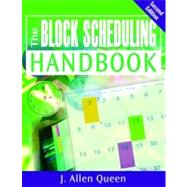
Note: Supplemental materials are not guaranteed with Rental or Used book purchases.
Purchase Benefits
What is included with this book?
| Dedication and Acknowledgments | |
| About the Author | |
| The Current Status of Block Scheduling | |
| Block Scheduling and the High School | |
| Developmental Aspects of Growth and Behavior Physical Development From Early Childhood Through | |
| Adolescence Cognitive Growth Characteristics of Piaget's Stages of Cognitive | |
| Development Schemata and the Process of Assimilation, Accomodation, and Equilibration The Sensori-Motor Period | |
| The Period of Preoperational Thought | |
| The Period of Concrete Operations | |
| The Period of Formal Operations Cognitive | |
| Theory and Block Instruction Personality Development Erikson's Stages of Personality Development Implications of Erikson's Theory for Block | |
| Instruction | |
| Building the Block Culture in the School | |
| Selecting the Best Fit The 4- 4 Block Schedule Model The A/B Block Schedule Model The Modified Block New Lesson Designs for the Block | |
| Block Scheduling in the Middle School | |
| The Middle School Defined Characteristics of the Middle School | |
| Team Teaching Interdisciplinary Teaming Block Classes or Periods | |
| Advisory Programs Benefits of the Block Schedule in the Middle School | |
| Shortfalls of the Traditional Schedule | |
| The Flexible/Alternate/Navigate (FAN) | |
| Models Advantages of Modified Schedules in the Middle School Teaching in the Block in the Middle School Summary | |
| The Elementary School on the Block Historical Events Impacting the Elementary School National Initiatives America 2000 | |
| For Today's Students, Better, More Accountable Schools | |
| For Tomorrow's Students, a New Generation of American Schools | |
| For the Rest of Us (Yesterday's Students and Today's Workforce), a Nation of Students | |
| Communities Where Learning Can Happen Goals 2000 | |
| Educate America Act A State Example | |
| The Elementary Curriculum in North Carolina Technology English Language Arts Mathematics Science Social Studies Fine Arts | |
| Dance Fine Arts: Music Fine Arts | |
| Theater Fine Arts | |
| Visual Arts Organizational Patterns Disadvantages of Graded Arrangement Alternative Possibilities for Scheduling 4-Blocks Model for Elementary Education Parallel Block Scheduling | |
| Summary | |
| Aligning Standards and Course Content Models for Use of Instructional Time Limiting Content Notes to Remember Assigning Outside Content Integrating Content | |
| C-Clustering Curriculum Alignment and Instructional Pacing Curriculum Alignment | |
| Phase 1 Curriculum Alignment | |
| Phase 2 Instructional Pacing | |
| Phase 1 Instructional Pacing | |
| Phase 2 | |
| Sample of Curriculum Alignment and Pacing | |
| Effective Instructional Strategies for Block Scheduling Cooperative Learning | |
| The Case Method Socratic Seminar Synectics Concept Attainment Inquiry Method Simulations Recommendations for Improving Block Scheduling for the Future | |
| Teacher-Directed Instruction Direct Instruction as a Teaching Model | |
| Direct Instruction as a Continuum of Teaching Behaviors Summary Our Mr. Jefferson | |
| A Sample Teacher-Directed Lesson | |
| Discovery and Inquiry Discovery Learning History and Research Promises and Pitfalls Summary | |
| The Inquiry Training Model History and Research Promises and Pitfalls Summary | |
| Building the Tower: A Sample Discovery Method Activity | |
| Simulations and Role Play Simulations Forms for the Simulation Model Rationale for Appropriate Use Lesson Design History and Research Promises and Pitfalls Summary Gifted and Talented Simulation | |
| A Sample Lesson Using Simulation | |
| Cooperative Learning History and Researc | |
| Table of Contents provided by Publisher. All Rights Reserved. |
The New copy of this book will include any supplemental materials advertised. Please check the title of the book to determine if it should include any access cards, study guides, lab manuals, CDs, etc.
The Used, Rental and eBook copies of this book are not guaranteed to include any supplemental materials. Typically, only the book itself is included. This is true even if the title states it includes any access cards, study guides, lab manuals, CDs, etc.